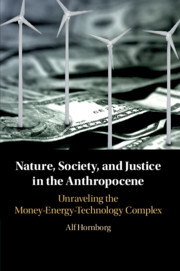Book contents
- Nature, Society, and Justice in the Anthropocene
- New Directions in Sustainability and Society
- Nature, Society, and Justice in the Anthropocene
- Copyright page
- Reviews
- Dedication
- Contents
- Figures
- Acknowledgments
- Introduction
- 1 Rethinking Economy and Technology
- 2 The Anthropocene Challenge to Our Worldview
- 3 Producing and Obscuring Global Injustices
- 4 The Money Game
- 5 Anticipating Degrowth
- 6 The Ontology of Technology
- 7 Energy Technologies as Time–Space Appropriation
- 8 Capitalism, Energy, and the Logic of Money
- 9 Unequal Exchange and Economic Value
- 10 Subjects versus Objects
- 11 Anthropocene Confusions
- 12 Animism, Relationism, and the Ontological Turn
- 13 Conclusions and Possibilities
- Afterword
- References
- Names Index
- Subject Index
12 - Animism, Relationism, and the Ontological Turn
Published online by Cambridge University Press: 24 June 2019
- Nature, Society, and Justice in the Anthropocene
- New Directions in Sustainability and Society
- Nature, Society, and Justice in the Anthropocene
- Copyright page
- Reviews
- Dedication
- Contents
- Figures
- Acknowledgments
- Introduction
- 1 Rethinking Economy and Technology
- 2 The Anthropocene Challenge to Our Worldview
- 3 Producing and Obscuring Global Injustices
- 4 The Money Game
- 5 Anticipating Degrowth
- 6 The Ontology of Technology
- 7 Energy Technologies as Time–Space Appropriation
- 8 Capitalism, Energy, and the Logic of Money
- 9 Unequal Exchange and Economic Value
- 10 Subjects versus Objects
- 11 Anthropocene Confusions
- 12 Animism, Relationism, and the Ontological Turn
- 13 Conclusions and Possibilities
- Afterword
- References
- Names Index
- Subject Index
Summary
In the previous two chapters I have critically discussed so-called posthumanist approaches in social science, and I have mentioned that much contemporary anthropology is committed to an outlook frequently referred to as the ontological turn. In a nutshell, most proponents of this outlook would argue that different groups of people may literally live in different worlds. In their view, there is no single natural reality to which our various perspectives refer, but as many realities as there are perspectives. They would argue that to posit a scientific approach to reality as more valid and reliable than traditional, nonmodern ontologies such as animism is tantamount to adopting a condescending, top-down relation affiliated with European colonialism. While such condescension and outright contempt for non-European worldviews have been abundantly illustrated in the history of scientific thought, the indiscriminate rejection of Enlightenment concepts of reason and truth cannot be an appropriate response. However, my approach to the far-reaching social consequences of artifacts such as money and technology suggests a concession that there are aspects of an object-oriented posthumanist ontology that deserve to be integrated into social theory. It is because of this conundrum that I devote so much space to the deliberations of posthumanists on the role of nonhuman objects in social life. As we have seen, there are indeed fundamental aspects of a “modern” outlook that implicate colonialism and should be rejected, but paradoxically, the identification of such points of symbiosis between Enlightenment science and colonialism is best accomplished precisely by applying Enlightenment concepts of reason and truth. While I share the anticolonial aspirations of so-called political ontology (Blaser 2013), I do not think that radical ontological relativism will help to expose the power structures and asymmetric resource flows that continue to underpin neocolonialism today.
- Type
- Chapter
- Information
- Nature, Society, and Justice in the AnthropoceneUnraveling the Money-Energy-Technology Complex, pp. 208 - 230Publisher: Cambridge University PressPrint publication year: 2019

